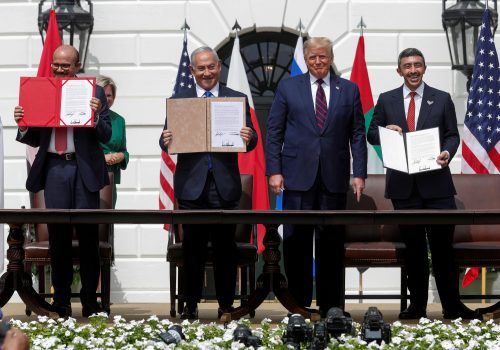Netanyahu must adapt to the new Washington
After four red hot years under the Trump administration, during which Prime Minister Benjamin Netanyahu scored sizable victories—the United States recognized Israel’s sovereignty over the Golan Heights, moved its Embassy to Jerusalem, rolled out a favorable “peace” agreement, and helped underwrite normalization with three of its neighbors—the accession of President-elect Joe Biden to the White House will usher in an uncertain era in US-Israel relations. The “bromance” between Netanyahu and Trump has alienated Democrats and a deliberate strategy of partisan politics has left Netanyahu in an unenviable position if he earnestly wants to continue the momentum gained over the past four years. The question now is whether the Israeli prime minister wants to put his country’s interests above his own.
Partisan politics are a dangerous game, one that Netanyahu has played with gumption. The prime minister’s partisan fight with the left long predates the Donald Trump presidency: a bitter dispute with President Bill Clinton over the peace process almost cost him the election in 1996. During the Barack Obama administration, he relied on Congress to serve as a foil when disagreements arose. While Netanyahu still secured the largest US security assistance package in history and successfully leveraged tensions for personal political gains at home, his behavior cost Israel leverage on critical issues—including Iran.
A Biden presidency offers Netanyahu an opportunity to reset the tone with the party. Biden is a foreign policy centrist with a nostalgic view of Israel that is increasingly rare in the Democratic party. A longtime supporter of the US-Israel relationship, his track record in Congress on pro-Israel legislation was, for the most part, sterling. He was hailed as the friend Israelis could turn to even during moments of peak tension with President Obama.
But Netanyahu mustn’t get too comfortable: Biden’s policy objectives will not necessarily mirror his own. Unlike Trump, he is poised to resuscitate the Palestinian cause, however modestly. He is also likely to pursue some form of rapprochement with Iran to salvage the Joint Comprehensive Plan of Action (JCPOA). The foreign policy consensus is also shifting. Americans on both sides of the aisle want to reduce our involvement in the Middle East. Democrats, including close friends of Israel among them, are advocating for restraint, diplomacy, and multilateralism—approaches that grind at the Israelis. The economic toll of the coronavirus pandemic is likely to sharpen these trends and foreign aid will not be immune from spending cuts. Aid to Israel could endure new scrutiny.
Congress may no longer offer Netanyahu the same refuge he once enjoyed. The landscape on the Hill is shifting: pro-Israel stalwarts on both sides of the aisle are retiring by choice or force. Eliot Engel (D-NY) and Nita Lowey (D-NY), tireless Israel advocates who chaired the powerful House Committees on Foreign Affairs and Appropriations, respectively, which were key in advancing a pro-Israel agenda, will not return in 2021. Their expected replacements are unlikely to prioritize pro-Israel legislation with the same zeal. Less friendly faces are also moving up in the ranks; Congresswomen Betty McCollum (D-MN) and Barbara Lee (D-CA), who have clashed openly with the pro-Israel community, will both assume influential roles in budgeting aid for Israeli security and its myriad pet projects. In the Senate, Patrick Leahy (D-VT), who has tangled with Israel over human rights concerns, will lead the Democrats in Appropriations. Support for Israel remains a consensus issue on the Hill, but the contours of that support are shifting. Policy makers differentiate support for Israel with support for its leadership. Convincing them to reconcile the two will not be easy.
The 2020 US presidential election may be the splash of cold water needed to chasten Netanyahu. If the prime minister wants to advance Israel’s interests in the new Washington—or at least have a seat at the table as critical decisions affecting the region are made—he will need to moderate his behavior. A conciliatory tone, including a warm embrace of Biden, is a good start.
If Netanyahu hopes to build bridges to Democratic offices, toning down his incendiary rhetoric at home will help. Exercising restraint in the West Bank, including freezing settlement construction—particularly outside the security barrier—and extending meaningful concessions to the Palestinians will also go a long way. It would also be good, moral policy. And, if his imperiled government survives, he should swallow his pride and leverage moderate coalition partners like Benny Gantz, who Democrats are willing and even eager to work with. Americans on both sides of the aisle value the US-Israel relationship, but they’re tired of Netanyahu’s kowtowing to the right—in Jerusalem and in Washington. It’s time to adapt to a new landscape. If not, Netanyahu and Israel could be in for a chilly four years.
Carmiel Arbit is a nonresident senior fellow for Middle East Programs at the Atlantic Council, and a co-founder of Key Bridge Strategies. She researches and writes on US-Israel relations and has consulted for NGOs around the world, including in Israel and the Palestinian Territories.
Image: Israel's Prime Minister Benjamin Netanyahu (L) shakes hands with U.S. Vice President Joe Biden during their meeting at Netanyahu's residence in Jerusalem March 9, 2010. Biden assured Israel on Tuesday of Washington's commitment to its security and said the agreed resumption of Israeli-Palestinian talks provided a "moment of real opportunity" for peace. REUTERS/Ronen Zvulun


